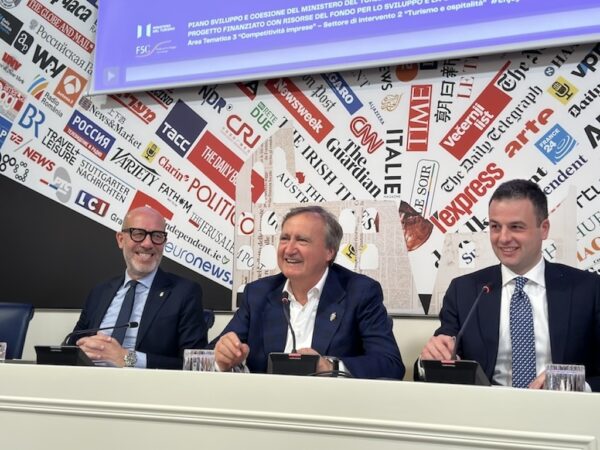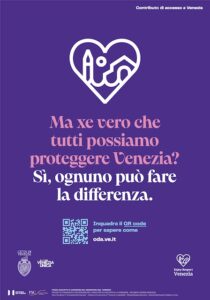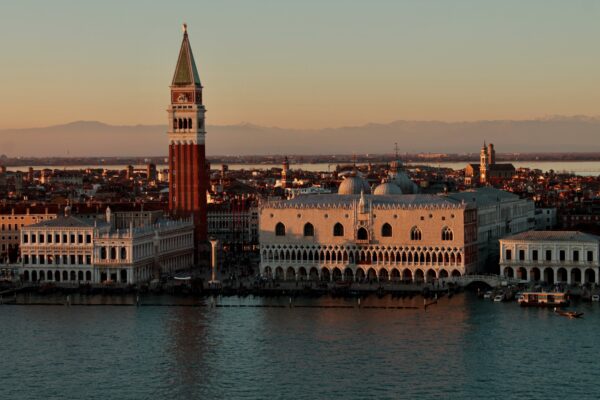
Luigi Brugnaro, the mayor of Venice, flanked by Michele Zuin, the city’s Controller,and Simone Venturini, Director of Venice’s Tourist Board at the Foreign Press Association, All photos are Courtesy of the city of Venice.
On March 19 Sergio Mattarella, The President of Italy, inaugurated the new headquarters of the Foreign Press Association in what had been the Roman residence of former Prime Minister of Italy, Silvio Berlusconi. Some three weeks later the key speaker at the Foreign Press Association’s first official press conference in its new home was Luigi Brugnaro, the Mayor of Venice. He came to explain to the world the new rules for tourists visiting La Serenissima. For as he said in his opening remarks “Venice is in Italy, but belongs to the world”.
The plan to charge an entrance fee to day-trippers was first proposed in 2019, but never put into practice. The writing on the wall came last August when UNESCO threatened to put Venice on its list of “World Heritage Sites in Danger” thereby abolishing its financial support. UNESCO cited that Italy had not done enough to protect her unique city of some 50,000 inhabitants from flood waters (acqua alta) and from mass tourism: some 40,000 day-trippers each day climbing to 100,000 during summer. They spend little money and perpetually clog its calle or narrow streets and leave behind piles of garbage. The UNESCO ultimatum was dropped when Venice’s city government officialized a trial pilot-project tax or Contributo di Accesso (CDA) on January 16, 2024.
“We need to protect our city from climate change, maintain it wooden piles, support sustainable tourism, create new events, improve the quality of life of our residents, and encourage new people to live here”, said Brugnaro. “Many cities have the problem of over-crowding because of mass tourism, but we are the first to introduce a tax. We haven’t put a limit on numbers for any given day or event like Carnevale, but the eyes of the world are going to monitor our success. Thanks to CDA we will know exactly how many tourists came to Venice on any given day.”

Page of the CDA
So, starting on April 25 and for another 29 days mostly around national holidays and weekends through July 15, day-trippers to historic Venice will have to register ahead by clicking on multi-lingual www.cda.ve.it and pay 5 euros to obtain a QR code-valid from 8:30am to 4pm (later-in-the day visits are registration free). All tourists, each individual, spending the night will also have to register ahead and receive a QR code, but will be exempt from the fee. All the other exemptions, clearly listed on the website, don’t apply to out-of-region tourists unless they’re visiting for a day only. The website also includes a page listing all the upcoming special events taking place in Venice during 2024 to help potential visitors choose the dates of their visit.
Everyone will be required to show their QR code when first entering the historic center at obvious checkpoints: the airport, train station, parking lot and garage at Piazzale Roma, some beachfront locations like The Lido and St. Mark’s Square, but there will be unexpected spot checks throughout the city.
If you arrive without a QR code, don’t despair; you can buy one at the last minute on your smartphone or at kiosks near the checkpoints. Transgressors, however, will face fines of 50 to 300 euros plus a 10-euro fee.
“The CDA is not about making money. Its operative costs will be higher than its revenue,” said Brugnaro, “but another advantage of the CDA will be the curbing of the growing number of illegal Airnbs since anyone staying overnight will need to register where they are staying.”
Post-Press-Conference: Starting June 1, guided groups touring the historic center as well as the islands of Murano, Burano, and Torcello will be limited to 25 persons. The use of loud speakers by guides will also be banned.
Also, on the bright side between January 16 when the tax appeared on the books and the April 4th press conference more than 50,00 people had registered via cda.ve.it; about a third of them had paid for one-day visits. “If the tax continues to be a successful deterrent to over-tourism” continued Brugnaro, “we will prolong its dates and maybe raise its price.”
To help you plan your visit and learn why Venice is so special click on https://cdamedia.veneziaunica.it/. Bi-lingual in Italian and English, it includes interviews with the mayor Luigi Brugnaro, Simone Venturini, the head of the city’s tourist board, and with residents in all walks of life, who answer your specific practical questions: barber, real estate agent, city employees, manager of 5-star hotel, and gondolier to name a few.
